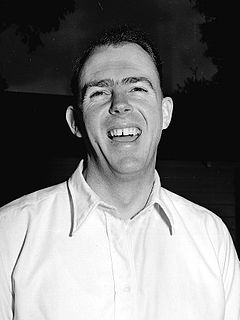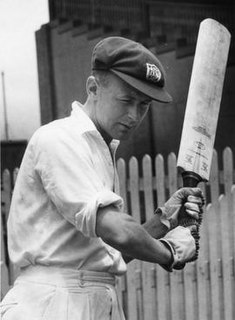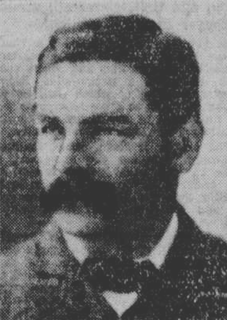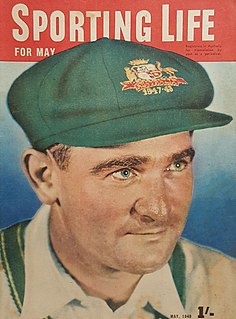Related Research Articles
Charles Bannerman was an English-born Australian cricketer. A right-handed batsman, he represented Australia in three Test matches between 1877 and 1879. At the domestic level, he played for the New South Wales cricket team. Later, he became an umpire.

William Arras Johnston was an Australian cricketer who played in forty Test matches from 1947 to 1955. A left arm pace bowler, as well as a left arm orthodox spinner, Johnston was best known as a spearhead of Don Bradman's undefeated 1948 touring team, well known as "The Invincibles". Johnston headed the wicket-taking lists in both Test and first-class matches on the tour, and was the last Australian to take over 100 wickets on a tour of England. In recognition of his performances, he was named by Wisden as one of its Cricketers of the Year in 1949. The publication stated that "no Australian made a greater personal contribution to the playing success of the 1948 side". Regarded by Bradman as Australia's greatest-ever left-arm bowler, Johnston was noted for his endurance in bowling pace with the new ball and spin when the ball had worn. He became the fastest bowler to reach 100 Test wickets in 1951–52, at the time averaging less than nineteen with the ball. By the end of the season, he had played 24 Tests and contributed 111 wickets. Australia won nineteen and lost only two of these Tests. In 1953, a knee injury forced him to remodel his bowling action, and he became less effective before retiring after aggravating the injury in 1955. In retirement, he worked in sales and marketing, and later ran his own businesses. He had two sons, one of whom became a cricket administrator. Johnston died at the age of 85 on 25 May 2007.

Sidney George Barnes was an Australian cricketer and cricket writer, who played 13 Test matches between 1938 and 1948. Able to open the innings or bat down the order, Barnes was regarded as one of Australia's finest batsmen in the period immediately following the Second World War. He helped create an enduring record when scoring 234 in the second Test against England at Sydney in December 1946; exactly the same score as his captain, Don Bradman, in the process setting a world-record 405-run fifth wicket partnership. Barnes averaged 63.05 over 19 innings in a career that, like those of most of his contemporaries, was interrupted by the Second World War.

Raymond Russell Lindwall was a cricketer who represented Australia in 61 Tests from 1946 to 1960. He is widely regarded as one of the greatest fast bowlers of all time. He also played top-flight rugby league football with St. George, appearing in two grand finals for the club before retiring to fully concentrate on Test cricket.

Arthur Robert Morris was an Australian cricketer who played 46 Test matches between 1946 and 1955. An opener, Morris is regarded as one of Australia's greatest left-handed batsmen. He is best known for his key role in Don Bradman's Invincibles side, which made an undefeated tour of England in 1948. He was the leading scorer in the Tests on the tour, with three centuries. His efforts in the Fourth Test at Headingley helped Australia to reach a world record victory target of 404 on the final day. Morris was named in the Australian Cricket Board's Team of the Century in 2000 and was inducted into the Australian Cricket Hall of Fame in 2001.

Patrick George McShane was an Australian cricketer who played in 3 Test matches between 1885 and 1888.

Samuel Cosstick was an important figure in developing cricket in Victoria in its formative years. He is well known for umpiring in the second ever Test match, played between Australia and England in Melbourne, 1877.
Colin John "Col" Egar was an Australian Test cricket umpire.

George Eric Borwick was a cricket Test match umpire.

Douglas Thomas Ring was an Australian cricketer who played for Victoria and for Australia in 13 Test matches between 1948 and 1953. In 129 first-class cricket matches, he took 426 wickets bowling leg spin, and he had a top score of 145 runs, which was the only century of his career.
Louis Patrick "Lou" Rowan was an Australian Test cricket match umpire who umpired the first One Day International at the Melbourne Cricket Ground on 5 January 1971. He umpired 25 Test matches between 1963 and 1971 and became Australia's senior umpire after the retirement of Col Egar. As a Detective Sergeant with the Queensland drug squad, Rowan took no nonsense and was inclined to stand on his authority. His first match was with Umpire Bill Smyth between Australia and England at Sydney on 11 January to 15 January 1963.
Thomas Francis Brooks OAM was an Australian Test cricket match umpire who was born in Paddington, New South Wales. Brooks had earlier played first class cricket for NSW.
Alan Lloyd "Froggy" Thomson is a former Australian cricketer, Australian rules football umpire and school teacher. Thomson, who "bowled off his front leg like a frog in a windmill" played in four Tests and one ODI in the 1970–71 season.
Clarence Edgar "Mick" Harvey was a first-class cricketer and Australian Test cricket umpire. He was the brother of Test batsmen Merv and Neil Harvey. He was born at Newcastle, New South Wales and died at Brisbane, Queensland.

Winston Place was an English cricketer who played in three Tests in 1948. An opening batsman for Lancashire, he shared a prolific partnership with Cyril Washbrook and was part of the county championship winning side of 1950. Place played first-class cricket until 1955, when his contract was not renewed. He became an umpire for one season, but retired to spend more time with his family.
Raymond Charles Isherwood and was an Australian Test cricket match umpire.

John Drake ("Jack") Scott was an Australian cricketer and Test match umpire. Scott played as a right-arm fast bowler and was also a useful lower-order right-handed batsman. He was the first man to dismiss Don Bradman in first-class cricket, in December 1927. Scott went on to umpire fifty games, including ten Ashes tests.

John "Jack" Crossland was an English professional cricketer who played first-class cricket between 1878 and 1887. Crossland was recognised as one of the fastest bowlers in county cricket, but critics generally believed that he threw, rather than bowled the ball, a practice illegal in cricket. Contemporaries suggest that, but for the suspicions over his bowling action, Crossland would have played Test cricket for England.

Jack Marsh was an Australian first-class cricketer of Australian Aboriginal descent who represented New South Wales in six matches from 1900–01 to 1902–03. A right-arm fast bowler of extreme pace, Marsh was blessed with high athletic qualities and was regarded as one of the outstanding talents of his era. His career was curtailed by continual controversy surrounding the legality of his bowling action; he was no-balled multiple times for throwing. As a result of the debate over the legitimacy of his action, Marsh never established himself at first-class level and was overlooked for national selection. In contemporary discourse, Marsh's lack of opportunities has often been attributed to racial discrimination.

Sid Barnes was a key member of Donald Bradman's famous Australian cricket team, which toured England in 1948. The team went undefeated in their 34 matches; this unprecedented feat by a Test side touring England earned them the sobriquet The Invincibles. A right-handed opening batsman, Barnes was part of Bradman's first-choice team and played in four of the five Tests—he missed one match due to injury—partnering the left-handed Arthur Morris.
References
- ↑ "Herbert Elphinston". CricketArchive. Retrieved 6 August 2021.
- 1 2 3 "A Test ump. was never stumped". Daily Telegraph: 48. 3 December 1950.
- ↑ "Herbert Elphinston as Umpire in First-Class Matches". CricketArchive. Retrieved 6 August 2021.
- ↑ "Mix-up at end of day's play in Test". Daily Telegraph: 10. 10 January 1953.
- ↑ Robinson, Ray (19 April 1952). "N.S.W. bid to control bumper attack". The Mail: 5.
- Pollard, Jack, "Australian Cricket: 1948-1995, The Packer Years". Sydney, The Book Company, 1995.